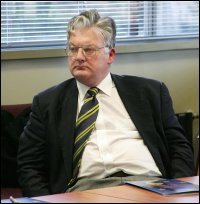
Dunne Talking
Whatever happened to United Future?
Christian voters around the country seem to be wondering just that. For many, this past parliamentary term may well be remembered as the “seedy one”—the one in which hookers got the green light and homosexual couples got the right to unite.
How on earth did all this happen? Or, rather, how on earth did Labour get away with it while hitched to an apparently Christian party?
Jonathan M. let the Honourable Peter Dunne, leader of United Future, address these concerns himself.
JM: It could be said that Labour has made United Future look weak and impotent by passing a string of morally dubious laws right under the noses of a political partner perceived to be quite Christian. What would you say to such a claim?
PD: I reject the claim on many grounds. First, the matters you have referred to were passed by conscience votes—not just government votes. United Future MPs voted against all of them. By contrast, each of the measures concerned were passed because a number of National MPs voted for them. If, for example, Dr Brash had voted against the Prostitution Bill instead of for it, the Bill would have been defeated. Second, in a democracy the will of the majority always prevails. The implication in the question is that our 8 MPs should have been able to hold the remaining 112 MPs hostage on such legislation, and I reject that entirely.
Some believe that United Future compromised its effectiveness as a distinct voice by agreeing to support Labour on confidence and supply. Is this true? If not, how did United Future manage to maintain their effectiveness?
The result of the 2002 election meant only two government options were possible, given the numbers—a Labour government supported by the Greens or a Labour government supported by United Future. It was a no-brainer, really. We are a centre party that has to be capable of working with either side of politics and we have demonstrated in this term that we can do that. Not only have we ensured the most stable and longest-lasting government arrangement since MMP came in, but we have also achieved all of our key policy objectives from the last election, and everything that was in our agreement with Labour. At the same time we have not hesitated to oppose them when we differ and in fact have voted against Labour more often than the Greens have. A full list of our achievements is set out on our party website.
One thing United Future claims as a measure of its effectiveness is the establishment of the Families Commission. Isn’t this just adding bureaucratic fat to an already obese government?
The Families Commission is probably the most important social policy development in the last 50 years. For the first time, we have a government body dedicated to promoting the interests of families and ensuring over time that government policies reflect the interests of families. This is a long-term move which will not overturn overnight the stresses and strains families have been facing for the last generation or so, but will make a start, and it is vital that we do. In fact, in time the Families Commission will lead to less duplication in government services and far greater focus on family issues, and that has to be positive.
If United Future makes it back into Parliament later this year, how do you intend to protect and promote Christianity?
United Future will be in the next Parliament and our aim is that no government will be able to be formed without our participation. We will be promoting our policies and values and inviting the support and participation of all New Zealanders who agree with them.
The website www.stuff.co.nz reports that you are “adamant United Future is not a ‘Christian’ party.” Is that report accurate? If so, why should Christians vote for you? What does United Future offer that would interest the Christian voter?
United Future is not and never has been a church-based party. We respect and uphold the right of everyone to hold their own views. As a political party we promote policies that are in tune with the aspirations of the mainstream New Zealand family. Those policies appeal to many New Zealanders—Christians and otherwise—but are not aimed exclusively at any one group. Promoting religious beliefs and values are the province of the churches, not political parties. The role of a political party is to promote policies that are in the public interest and which attract the support of people accordingly. It is not our role to second guess the role of the church, or to mandate by law that which the church has been unable to achieve by its moral persuasion of its adherents. Having said that, we recognise the role of the church in society, and work closely with it. We have to operate in the interests of all New Zealanders, and we do that by promoting policies which we believe are good for all New Zealanders.

